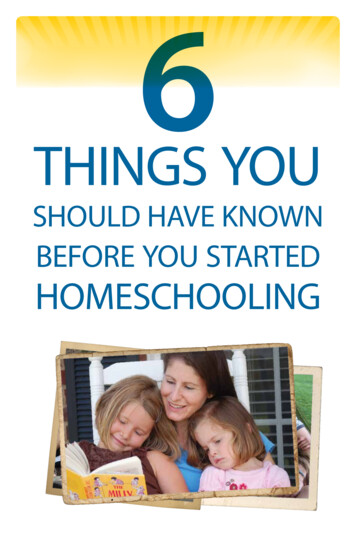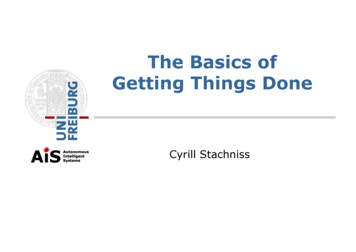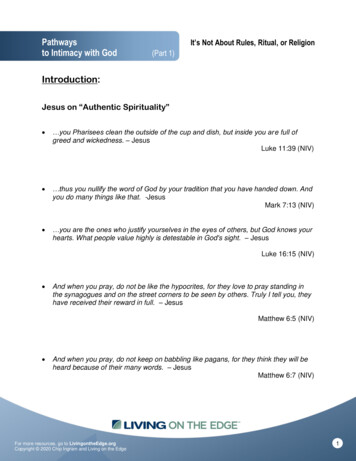
Transcription
6Things YouShould Have KnownBefore You StartedHomeschoolING
Published by Sonlight Curriculum, Ltd. 2010 Sonlight Curriculum, Ltd.www.sonlight.com
Before you browse these pages, take a minute and put your old shoes back on.(Figuratively, that is.) Read this resource guide as if you were just consideringhomeschooling for the first time. You might gain some useful tips and fresh perspective!1. You CAN teach your childrenPicture yourself settling down at your computer when you firstconsidered home education. You take a deep breath and google“homeschooling.” You have perfect clarity as you research . completeconfidence you can find what you need and be a great teacher, right?Not if you’re like most parents! Most homeschoolers have plenty ofquestions and doubts along the way. They’re just normal people doingwhat they believe is best for their unique children.They’ve discovered the beauty of homeschooling. They see naggingproblems with other educational models. And they’ve decided thathome education is a great option for their family.Did You Know? Home education (i.e., homeschooling) is a time-honored approachto education wherein parents take charge of their children’s learningand teach them outside the typical school structure. Homeschooling is legal in all 50 states and many countries. Millions of American children learn at home. The number ofhomeschooling families in the U.S. has been growing for decades. Homeschoolers consistently outperform peers on standardizedtests, regardless of the homeschooling parents’ level of education. Homeschool graduates now thrive in colleges, jobs and familiesall over the country.What does this mean for you?You can homeschool too! The main qualification is that you loveyour children and value their education. After all, you’ve alreadytaught your children naturally since birth. Visit www.sonlight.com/you-CAN-homeschool.html for serious encouragement from threehomeschool moms.1
2. Homeschooling is NOTfor everyoneEach family should weigh the pros and cons.Some Benefits of Home EducationYou get to. Be the central influence in your children’s lives. Tailor your children’s education according to their specific gifts,needs and learning styles. Build intimate and meaningful relationships with your children. Decide what your children learn and when they learn it. Share your values and beliefs with your children and guide them asdifficult questions surface. Save a lot of money compared to private school tuition. Protect your children from certain negative influences they mayencounter at school. Experience a lifestyle of freedom outside the constraints oftraditional school days and school years.Some Potential Disadvantages of Home EducationYou may have to. Justify homeschooling to family and friends who are concernedabout your decision to learn at home. Spend more time with your children than you’re accustomed to. Readjust your lifestyle and attitude as you live on a single incomeand go against the flow of modern culture. Spend money to buy quality curriculum (but it’s far cheaper thanprivate school!). Encourage your children even when you don’t feel like it. Deal with the frustrations of sometimes feeling “behind.” Get out of your comfort zone as you learn how to homeschooleffectively.2
3. You don’t have to do it aloneAn internet search can lead you to thousands of homeschool resources.Here are some of the very best:Books The Three R’s by Ruth Beechick (for grades K-3): Teach reading, writingand arithmetic in a way your children will understand and love. The Way They Learn by Cynthia Tobias: Discover your children’slearning styles and find the teaching approaches that are right foryour unique family. For the Children’s Sake: Foundations of Education for Home andSchool by Susan Schaeffer Macaulay: A short introduction to homeeducation philosophy and practice. Give your children an educationthat is warm, intelligent and full of life.Local Homeschoolers Local Homeschool Support Groups: Help awaits you at thesegatherings of local homeschoolers. Google your state and“homeschool support group” to find a list of groups in your area.Look one up, gather your courage and go! State Homeschool Conventions: These exciting events drawhundreds or thousands of area homeschoolers and feature speakers,workshops and curriculum displays.A Website and Magazine Heart of the Matter (HeartOfTheMatterOnline.com): a Christianhomeschooling site offering organized encouragement and help. Homeschool Enrichment: an evangelical magazine filled withencouraging articles and practical advice.Legal Resources Homeschool Legal Advantage (HomeschoolLegalAdvantage.com)and The Home School Legal Defense Association (HSLDA.org) aresources of help, advice and resources about homeschooling and laws.3
4. It helps to plan (at least a little)Use this checklist to get started:1. Meet other homeschoolers and gather ideasRead books, magazines and online articlesFind and attend a local support group meeting (google yourlocation and “homeschool support group”)Talk with others who are already homeschooling and find aveteran home educator willing to mentor youConsider attending a state homeschool convention2. Create your homeschool vision and goalsWrite a homeschool mission statement: An explanation of yourfamily’s big-picture goals. Answer the question “why are wehomeschooling?” This will guide you as you plan and encourageyou (by reminding you of the “big picture”) for years to come.Write 2 academic, physical, spiritual and social goals for each child.Decide what you ultimately hope to accomplish throughhomeschooling.3. Consider how homeschooling will fit into your lifestyleDefine the roles of each parent with respect to your homeschoolList lifestyle priorities: what will you set aside and what will youemphasize as your family adjusts to homeschooling?4. Choose curriculumCarefully consider the various educational philosophies todiscern which might work best for your familyRequest catalogs and review websites of programs that interest youTry to find someone who has experience with the curriculum youare considering5. Meet any state requirementsConnect with a local homeschool support group (preferably onewith some members who live in your school district)Contact your state homeschool organization for a knowledgeablereview of your state’s requirementsSubmit any necessary paperworkHead to www.sonlight.com/getting-started for more details and ideas.4
5. There is no one “correct” wayto homeschoolHomeschooling is about freedom. You’ll find many possible approachesto teaching your children, each with pros and cons. No one style is rightfor everyone. Most families find their stride with two or more teachingstyles. Some veteran homeschoolers recommend finding one curriculumfor at least your first year, preferably one with excellent teacher’s guides.Traditional/Textbook CurriculumSimilar to the classroom experience you may have grown up with,this approach includes graded textbooks or workbooks to cover eachsubject. Curriculum typically includes teacher’s manuals, tests andrecord-keeping materials.ProsConsFamiliar formatPotentially boringEasy record-keepingLearning is not as interactive and relationalas it can be with other styles.Examples of Traditional/Textbook curriculum publishers:A Beka Books www.abeka.comAlpha Omega www.aop.comBob Jones University Press www.bjupress.comClassical EducationThe classical model emphasizes classic literature over textbooks. Theprimary grades focus on learning facts, middle school students learnto think through arguments and high school trains students to expressthemselves. Students often learn Latin and Greek, read the greatliterature of Western civilization and study history chronologically.Pros:Cons:Helps children become convincing writers,thinkers and speakersPotentially intimidating in scope anddifficultySystematic approach can help parents feelthey’re covering everythingA focus on memorization in the early yearscan be boring for childrenExamples of Classical Education curriculum publishers:Classical Conversations www.classicalconversations.comCalvert School www.calvertschool.orgTapestry of Grace www.tapestryofgrace.com5
Unit StudiesThe Unit Studies approach explores topics one at a time. Entirefamilies delve into one topic (e.g., farms or the American Civil War) asa springboard for further learning in many subjects.Pros:Cons:Children of all ages (K-12) can study thesame topics at the same timeSignificant lesson planning, preparation andresearch often required from the parent; difficult to ensure you’re covering everythingCan make homeschooling creative and funwhile encouraging connections betweensubject areasCan be hard to use the same program tomeet the educational needs of young andolder children as they learn together.Examples of Unit Study curriculum publishers:KONOS www.konos.comMy Father’s Word www.mfwbooks.comFive in a Row www.fiveinarow.comUnschooling/Relaxed HomeschoolingUnschooling seeks to feed children’s natural enthusiasm for learning.Rejecting formal instruction and curriculum, parents help childrenfollow their interests and discover learning in everyday life.Pros:Cons:Inspires children to pursue “natural learning”May be hard to meet state standards andprepare students academically for collegeParents don’t have to push children to learnthings they don’t want toCan be hard to let go of society’s standardsfor what children should be learningExamples of resources about unschooling:Delight-Driven Learning www.home-educate.com/unschoolingSandra Dodd’s Big Book of Unschooling, by Sandra DoddJohn Holt and Growing without Schooling www.holtgws.com6
Literature-Based LearningLiterature-rich curriculum uses great books as the centerpiece ofHistory, Literature, Bible and Geography. Engaging books (like greatliterature, biographies and historical fiction) make learning come aliveas kids remember and connect with what they read.Pros:Cons:Fosters a love of learning and allowsparents to be very involved in theirchildren’s educationInvolves lots of reading, which may beintimidatingStudents remember what they learnthrough stories and gain context forunderstanding history and the worldaround themCan be frustrating for parents who wanta facts-and-figures based approach toeducationExamples of Literature-Based curriculum publishers:Sonlight Curriculum: www.sonlight.comFive in a Row: www.fiarhq.comGreenleaf Press: www.greenleafpress.comFor more about these curriculum approaches, browse chapter four of CarlettaSander’s free e-book, 7 Secrets to Finding the Best Homeschool Curriculum, book.6. Yes, homeschooling is legalHomeschooling is perfectly legal in all 50 states and many countries.Some states in the U.S. have more regulations than others, so youshould review your state’s laws at ate.If you live outside the U.S., find laws at www.hslda.org/hs/international. For organizations supporting U.S. military families whohomeschool, check out www.hslda.org/orgs/#International.7
Frequently Asked QuestionsHow do homeschool students compareacademically to traditionally-schooled peers? Homeschooling tends to help students thrive academically. Parentsnaturally tailor the education according to each child’s special giftsand needs. Homeschooled students consistently score far above the nationalaverage on standardized testing. In one recent study, homeschoolstudents averaged between 33-40 percentile points above thenational average. Even those homeschoolers whose parents don’thave college degrees averaged at the 83rd percentile for the nation.Students whose parents both have degrees averaged at the 90thpercentile. Visit www.hslda.org and search for “2009 HomeschoolProgress Report” for an easy-to-read, fascinating summary of thisextensive study.Will Child Protective Services (CPS) contact me if Iremove my children from school? Most homeschoolers in the U.S. never face unwanted questioningor legal issues. Visit www.vahomeschoolers.org/law/cps.aspfor encouraging answers from a member of the Virginia ChildProtective Services. For practical ways to avoid investigation, and for clear stepby-step advice of what to do in the (unlikely) event that youare contacted by a truant officer or social service worker, .What about standardized testing? Some states require periodic standardized testing for homeschoolers.Head to atefor information about your state. Curious parents can use standardized testing to gauge their children’sprogress. For a thorough perspective on standardized testing, checkout homeschooling.gomilpitas.com/articles/010499.htm. Visit www.hslda.org/highschool/testing.asp#standardized fordescriptions and links to everything from early reading tests toAdvanced Placement (AP) tests and the SAT.8
What happens after high school? Canhomeschoolers get into college? Most U.S. colleges welcome homeschool students with open arms.Many schools even have an admissions counselor dedicated toworking with homeschool students. You should definitely plan the high school years in order to helpyour children get into their choice schools and earn scholarships.Find resources at www.thehomescholar.com and y4College.htm. Find an example of scholarships for homeschoolers at www.sonlight.com/scholarships. College is certainly not the only option. For resources on otheropportunities after graduation, see www.hslda.org/highschool/after.asp.What about socialization? Many prospective homeschool parents wonder if their childrenwill be “properly socialized.” But consider: Instead of spending 6 hours a day in a pressure-filled environment of same-age peers,homeschooled children spend most of their time interacting inmore natural settings with children and adults of all ages. And theytypically participate in many groups outside the home like sportsteams, music ensembles, homeschool co-ops and church groups. The vast majority of homeschool students become well-adjustedadults who are productive, pleasant, contributing members ofsociety. In Home Educated and Now Adults, Dr. Brian Ray findsthat adults who were homeschooled are more likely than their nonhomeschooled to be involved in their communities, satisfied withtheir work and finances, and “very happy” in life. And isn’t thatwhat you want for your kids?Am I qualified to teach my children? If you can survive the adoption process or give birth and raise a littleone, you can certainly homeschool, too. You know your childrenbest, and you care about them more than anyone else. You will findwhat works for them and make sure they learn. Visit www.sonlight.com/you-CAN-homeschool.html for insightful encouragement. There are plenty of homeschool resources to help along the way. Parentshave homeschooled successfully for centuries; you can do it too!9
About Sonlight Curriculum“I was nervous at first about homeschooling, butwith Sonlight it all came naturally! We just followedSonlight’s Instructor Guide and before I knew it, my sonwas reading everything, writing, understanding mathand science, and asking questions constantly about howthe world works.” —Chandra H, Aug. 2009For over 20 years, Sonlight has equipped parentsworldwide to give their children a well-rounded,literature-rich, globally-focused education froma Christian worldview. Sonlight lets you: Teach with confidence without stressful lessonplanning. Be the central influence in your children’sacademic and moral formation. Breathe easy with a one-year “Love to Learn”money-back guarantee when you buy a fullcurriculum package.“Thanks Sonlight for a great first year of homeschooling! The schedule is veryconvenient and ‘open and go.’” –Amy P, March 2009Request a free catalog today at www.sonlight.com/request-catalog.html.Check out “27 Reasons Not to Buy Sonlight” to see if Sonlight may (ormay not!) be right for you: www.sonlight.com/not-to-buy.html.Contact Us8042 South Grant WayHomeschooling Questions?Contact a Sonlight Curriculum Advisor for free.Littleton, CO 80122main@sonlight.com(303) .com
Examples of Literature-Based curriculum publishers: Sonlight Curriculum: www.sonlight.com Five in a Row: www.fiarhq.com Greenleaf Press: www.greenleafpress.com For more about these curriculum approaches, browse chapter four of Carletta Sander’s free e-book











